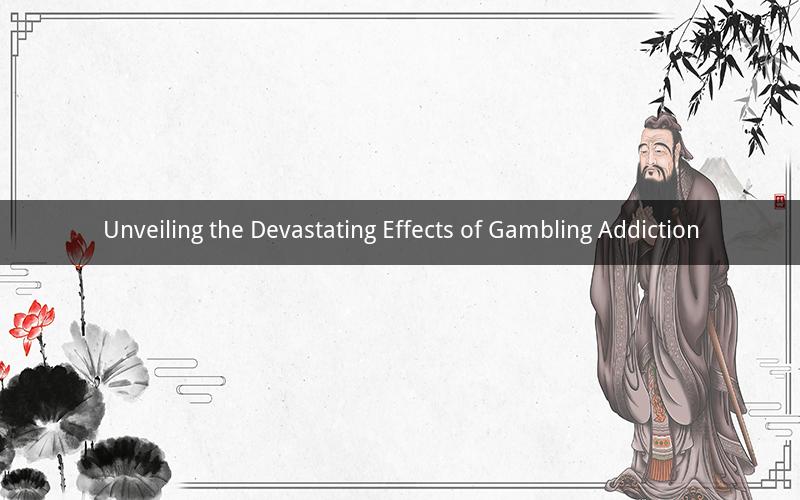
Introduction:
Gambling addiction, also known as pathological gambling, is a significant issue affecting individuals globally. It involves uncontrollable urge to gamble, despite the negative consequences it brings. This article aims to explore the various effects of gambling addiction on individuals, families, and society as a whole.
1. Emotional and Psychological Effects:
a. Depression and Anxiety: Gambling addiction often leads to emotional instability, causing individuals to experience intense feelings of depression and anxiety. The constant pursuit of winning can result in mood swings and emotional turmoil.
b. Suicidal Thoughts: The financial strain and personal failures associated with gambling addiction can lead individuals to contemplate or attempt suicide as a means of escaping their problems.
c. Low Self-esteem: Continuous failures in gambling can erode an individual's self-esteem, leading to feelings of worthlessness and a lack of self-worth.
2. Financial Consequences:
a. Bankruptcy: One of the most severe effects of gambling addiction is financial ruin. Individuals may go into debt, sell their assets, and even borrow money from friends and family, leading to bankruptcy.
b. Loss of Savings and Investments: Addicts may deplete their savings and investments in pursuit of gambling, leaving them without a financial safety net.
c. Impoverishment: In extreme cases, gambling addiction can lead to complete impoverishment, leaving individuals and families without basic necessities.
3. Social and Family Effects:
a. Marital Strain: Gambling addiction can strain relationships, leading to increased conflicts, infidelity, and even divorce. Spouses and family members may feel neglected, angry, and betrayed.
b. Broken Trust: The deceitful nature of gambling addiction can break down trust within families and relationships, making it difficult to rebuild.
c. Isolation: Individuals with gambling addiction may withdraw from their social circles, leading to feelings of loneliness and isolation.
4. Legal and Criminal Consequences:
a. Illegal Activities: In an attempt to sustain their gambling habits, individuals with gambling addiction may resort to illegal activities, such as theft, fraud, and embezzlement.
b. Legal Proceedings: If caught, individuals may face legal repercussions, including fines, imprisonment, or other penalties.
c. Damage to Reputation: The association with illegal activities can tarnish an individual's reputation, impacting their personal and professional life.
5. Work and Academic Performance:
a. Absenteeism: Individuals with gambling addiction may frequently be absent from work or school due to the need to gamble or recover from losses.
b. Decreased Productivity: The obsession with gambling can lead to a decline in work or academic performance, affecting job stability and educational achievements.
c. Career Ruin: In some cases, gambling addiction may lead to the loss of a job or career, as employers may not tolerate the repeated absences and decreased productivity.
6. Impact on Children and Young Adults:
a. Neglect: Individuals with gambling addiction may neglect their children, failing to provide the necessary care, attention, and guidance.
b. Financial Dependence: Children may become financially dependent on their addicted parents, leading to a lack of resources and opportunities.
c. Emotional Trauma: Witnessing the negative consequences of gambling addiction can have a lasting impact on children, leading to emotional and psychological trauma.
7. Societal Consequences:
a. Economic Burden: The financial strain caused by gambling addiction can lead to a burden on society, including increased costs for healthcare, social services, and law enforcement.
b. Crime Rates: The association with illegal activities can contribute to an increase in crime rates, affecting the overall safety and well-being of a community.
c. Mental Health Issues: The widespread impact of gambling addiction on mental health can lead to increased demand for mental health services, putting a strain on healthcare systems.
Frequently Asked Questions:
1. How can I identify if someone has a gambling addiction?
- Look for signs of excessive gambling, financial problems, and emotional distress. If these signs persist despite efforts to stop, it may be a sign of gambling addiction.
2. Can gambling addiction be treated?
- Yes, gambling addiction can be treated. Treatment options include therapy, counseling, support groups, and in some cases, medication. It is important for individuals to seek professional help to overcome their addiction.
3. Are there support groups available for individuals with gambling addiction?
- Yes, there are various support groups available, such as Gamblers Anonymous, which provide a supportive environment for individuals struggling with gambling addiction.
4. Can gambling addiction be hereditary?
- While there is no direct evidence linking gambling addiction to genetics, certain personality traits and family history may increase the risk of developing a gambling addiction.
5. How can I help a loved one with gambling addiction?
- Offer support and encouragement, encourage them to seek professional help, and be patient. Educate yourself about gambling addiction to better understand the challenges your loved one is facing.